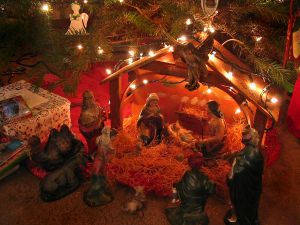Christmas 2007
Especially at this time of the year, Christians all over the world are making public statements about the supreme gift God the Father made to mankind: His own eternal Son, Jesus Christ the Lord.
 For hundreds of years before Jesus arrived on planet Earth, the Father had promised to His people Israel that His Son was coming to provide salvation to those who accept His Word. For example, Moses wrote (1,400 B.C.): “The LORD thy God will raise up unto thee a Prophet from the midst of thee, of thy brethren, like unto me; unto him ye shall hearken … And [God the Father confirmed that] it shall come to pass, that whosoever will not hearken unto my words which he shall speak in my name, I will require it of him” (Deut. 18:15, 19, KJV; cf. Acts 3:22).
For hundreds of years before Jesus arrived on planet Earth, the Father had promised to His people Israel that His Son was coming to provide salvation to those who accept His Word. For example, Moses wrote (1,400 B.C.): “The LORD thy God will raise up unto thee a Prophet from the midst of thee, of thy brethren, like unto me; unto him ye shall hearken … And [God the Father confirmed that] it shall come to pass, that whosoever will not hearken unto my words which he shall speak in my name, I will require it of him” (Deut. 18:15, 19, KJV; cf. Acts 3:22).
In His own words, the Son of God explained through the prophet Isaiah (700 years before He added a true and complete human nature to His eternal divine nature): “Come ye near unto me, hear ye this; I have not spoken in secret from the beginning; from the time that it was [i.e., at the creation], there am I: and now the Lord GOD, and his Spirit, hath sent Me” (Isa. 48:16). Also, “The Spirit of the Lord GOD is upon me; because the LORD hath anointed me to preach good tidings unto the meek… . To proclaim the acceptable year of the LORD” (Isa. 61:1, 2; cf. Luke 4:18-19).
When God’s only Son finally assumed a human nature—without in any way diminishing or changing His deity—in the womb of a young Jewish woman, His life on this earth began. Nine months later, Christ (the Greek word for Messiah, the Anointed One) was born. That was the first Christmas.
In His public ministry, the Lord Jesus Christ insisted repeatedly that the Father had sent Him into the world. No other human being has had or will have had a preexistent life: neither Adam nor Eve, nor any of their descendants—only the Lord Jesus Christ! So important is this fact that the Lord Jesus stated it 26 times in the Gospel of John alone!
For example: “I came down from heaven, not to do mine own will, but the will of him that sent me. … And this is the will of him that sent me, that every one which seeth the Son, and believeth on him, may have everlasting life” (John 6:38, 40).
But why did the Father send His Son to planet Earth? It was not simply to display a sinless and holy life—that display would amplify our sinfulness by contrast, and confirm our condemnation before God. He came to die as our divine/human substitute, “the Lamb of God, which taketh away the sin of the world” (John 1:29). Without being perfectly joined to a full human nature, a divine Person could never die. And we, as sinners in desperate need of a savior, would be forever without hope. But “God so loved the world, that he gave his only begotten Son, that whosoever believeth in him should not perish, but have everlasting life” (John 3:16).
No wonder the shepherds rejoiced at this news! And so did Joseph and Mary, and Zacharias and Elisabeth (the parents of Jesus’ forerunner, John the Baptist), and aged believers like Simeon and Anna, who had prayed for many years that God would permit them to see the Messiah (Luke 2:25-38). They were overwhelmed with joy and thankfulness.
Is that why we rejoice during the Christmas season? We must rejoice, not simply because God the Son became the God/man forever, but because He became our infinitely sufficient Savior!
“God our Saviour… . will have all men to be saved, and to come unto the knowledge of the truth. For there is one God, and one mediator between God and men, the man Christ Jesus; Who gave himself a ransom for all, to be testified in due time” (1 Tim. 2:3-6).
May everyone who reads these words have a truly meaningful and blessed Christmas!
 Dr. John C. Whitcomb has been a professor of Old Testament and theology for more than 50 years and is widely recognized as a leading biblical scholar. He taught at Grace Theological Seminary (Winona Lake, IN) from 1951-1990 and gained much recognition for his work on The Genesis Flood (Presbyterian and Reformed Publishing Company), which he co-authored with Dr. Henry Morris in 1961. That book has been credited as one of the major catalysts for the modern Biblical creationism movement. His ministry homepage is Whitcomb Ministries, and his sermons are available at SermonAudio.com. Dr. John C. Whitcomb has been a professor of Old Testament and theology for more than 50 years and is widely recognized as a leading biblical scholar. He taught at Grace Theological Seminary (Winona Lake, IN) from 1951-1990 and gained much recognition for his work on The Genesis Flood (Presbyterian and Reformed Publishing Company), which he co-authored with Dr. Henry Morris in 1961. That book has been credited as one of the major catalysts for the modern Biblical creationism movement. His ministry homepage is Whitcomb Ministries, and his sermons are available at SermonAudio.com. |


Discussion